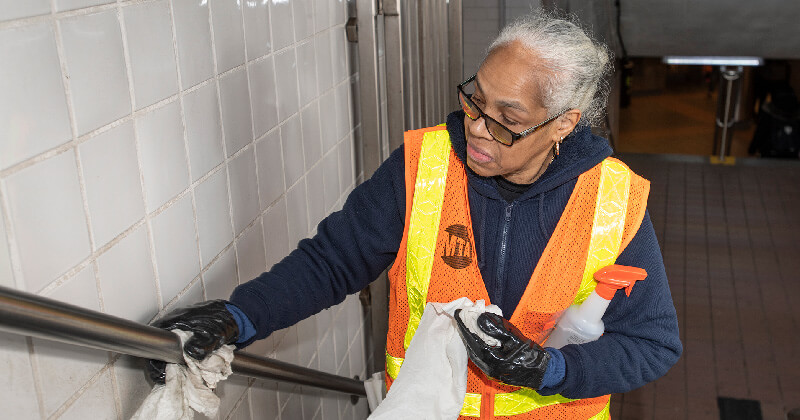
Arturo was cleaning the kitchen floor of a restaurant after his work shift one day and combined two of the cleaning solutions to save time. Little did he know, the mixture of the two cleaning products produced a chemical combination that became life-threatening. As he started to scrub, Arturo began to feel nausea, difficulty breathing, a tight chest, and a sharp, burning pain all over his skin. Some of his co-workers noticed his condition and brought him to the hospital, where he later died. Thirteen other workers and customers were sickened by the chemical exposure and were hospitalized before the restaurant was cleared and ventilated.
Workers use tens of thousands of chemicals every day. While many of these chemicals are suspected of being harmful, only a small number are regulated in the workplace and workers suffer both poisonings and long-term health effects due to chemical exposures on the job. The Occupational Safety and Health Administration estimates that each year workers suffer more than 190,000 illnesses and 50,000 deaths related to chemical exposures. Workplace chemical exposures have been linked to cancers, and other lung, kidney, skin, heart, stomach, brain, nerve, and reproductive diseases. All workers have the right to know about the chemicals they work with and community health workers can be an important source of information and support for workers. This webinar discusses how workers are exposed, the possible resulting health effects of exposure, and strategies to help workers best protect themselves.
Watch the Webinar Recording
Take the Evaluation
At the conclusion of this presentation, participants will be able to…
- Recognize how workers are exposed to chemicals on the job and the health effects.
- Describe basic safety practices when working around disinfectants and other chemicals.
- Understand the role of Community Health Workers in helping workers prevent chemical exposure.
Presenters

Amy
Liebman
MPA, MA
Chief Program Officer, Workers, Environment and Climate
Migrant Clinicians Network
Amy K. Liebman, MPA, MA (she/her) has devoted her career to improving the safety and health of disenfranchised populations. She joined Migrant Clinicians Network (MCN) in 1999 and currently serves as the Chief Program Officer: Workers, Environment and Climate. With MCN she has established nationally recognized initiatives to improve the health and safety of immigrant workers and their families. She oversees programs ranging from integrating occupational and environmental medicine into primary care to designing worker safety interventions. She is a national leader in addressing worker safety and environmental justice through the community health worker (CHW) model. She has been a strong advocate for worker health and safety during the COVID-19 pandemic, leading programs to improve access to care and culturally contextual education for migrants and immigrants. Prior to her current position, she directed numerous environmental health and justice projects along the US-Mexico Border including an award-winning, community-based hygiene education program that reached thousands of families living without water and sewerage services. She has spearheaded policy efforts within the American Public Health Association to support the protection of agricultural workers and served on the federal advisory committee to the EPA Office of Pesticide Programs. Her programs have won several awards including the 2008 EPA Children’s Environmental Health Champion Award and the 2015 National Safety Council Research Collaboration Award. In 2011, Liebman received the Lorin Kerr Award, an APHA/Occupational Health and Safety Section honor recognizing public health professionals for their dedication and sustained efforts to improve the lives of workers. And in 2024 she was honored with the Shelley Davis Humanitarian Award for her commitment to improving farmworker health and safety. She is a past Chair of APHA’s Occupational Health and Safety. Liebman has been the principal investigator and project manager of numerous government and privately sponsored projects. She has authored articles, bilingual training manuals and other educational materials dealing with environmental and occupational health and migrants. Liebman has a master’s degree from the LBJ School of Public Affairs at the University of Texas at Austin, and a Master of Arts from the Institute of Latin American Studies at the University of Texas at Austin. Liebman has traveled throughout Mexico, Guatemala, Argentina, Chile, and Europe. She is an avid soccer fan and loves to spend time with her husband and two sons. Together they spend a lot of time outdoors.

